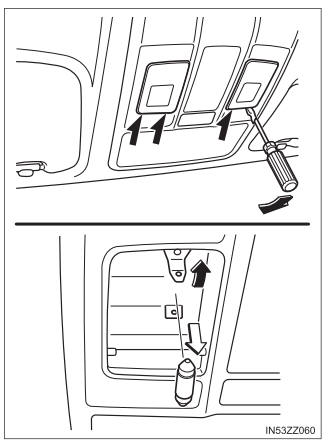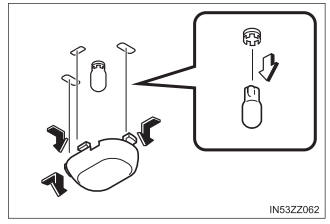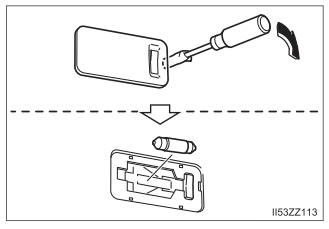Toyota Yaris: Light Bulbs / Replacing Interior Light Bulbs
Toyota Yaris XP210 (2020-2026) Owner's Manual / Maintenance and Care / Owner Maintenance / Light Bulbs / Replacing Interior Light Bulbs
Overhead lights/Map lights
- Wrap a small flathead screwdriver with a soft cloth to prevent damage to the lens, and then remove the lens by carefully prying on the edge of the lens with the flathead screwdriver.
- Disconnect the bulb by pulling it out.

- Install the new bulb in the reverse order of the removal procedure.
Trunk light (4-Door)
- Press both sides of the lens cap to remove it.
- Disconnect the bulb by pulling it out.

- Install the new bulb in the reverse order of the removal procedure.
Luggage compartment light (5-Door)
- Wrap a small flathead screwdriver with a soft cloth to prevent damage to the lens and remove the lens by carefully prying on the edge of the lens with the flathead screwdriver.
- Disconnect the bulb by pulling it out.

- Install the new bulb in the reverse order of the removal procedure.
 Replacing Exterior Light Bulbs
Replacing Exterior Light Bulbs
Headlights/Daytime running lights (With halogen headlights)
Make sure the ignition is switched off, and the headlight switch is
off.
Lift the hood...
 Fuses
Fuses
Your vehicle’s electrical system is protected by fuses.
If any lights, accessories, or controls do not work, inspect the
appropriate circuit protector...
Other information:
Toyota Yaris XP210 (2020-2026) Reapir and Service Manual: Installation
INSTALLATION PROCEDURE 1. INSTALL AIR CONDITIONING AMPLIFIER ASSEMBLY (a) Connect the 3 connectors. (b) Engage the guide to install the air conditioning amplifier assembly. (c) Install the 3 screws. (d) Install the front floor carpet assembly with the 2 clips as shown in the illustration...
Toyota Yaris XP210 (2020-2026) Reapir and Service Manual: Freeze Frame Data
FREEZE FRAME DATA DESCRIPTION The engine stop and start ECU records vehicle and driving condition information as freeze frame data the moment a DTC is stored. When troubleshooting, freeze frame data can be helpful in determining whether the vehicle was moving or stationary, whether the engine was warmed up or not, as well as other data recorded at the time of a malfunction...
Categories
- Manuals Home
- Toyota Yaris Owners Manual
- Toyota Yaris Service Manual
- Removal
- Fuse Panel Description
- Engine & Hybrid System
- New on site
- Most important about car
Front Seat Belt Pretensioners
The front seat belt pretensioners are designed to deploy in moderate or severe frontal, near frontal collisions.
In addition, the pretensioners operate when a side collision or a rollover accident is detected. The pretensioners operate differently depending on what types of air bags are equipped. For more details about the seat belt pretensioner operation, refer to the SRS Air Bag Deployment Criteria.
Copyright © 2026 www.toyaris4.com
